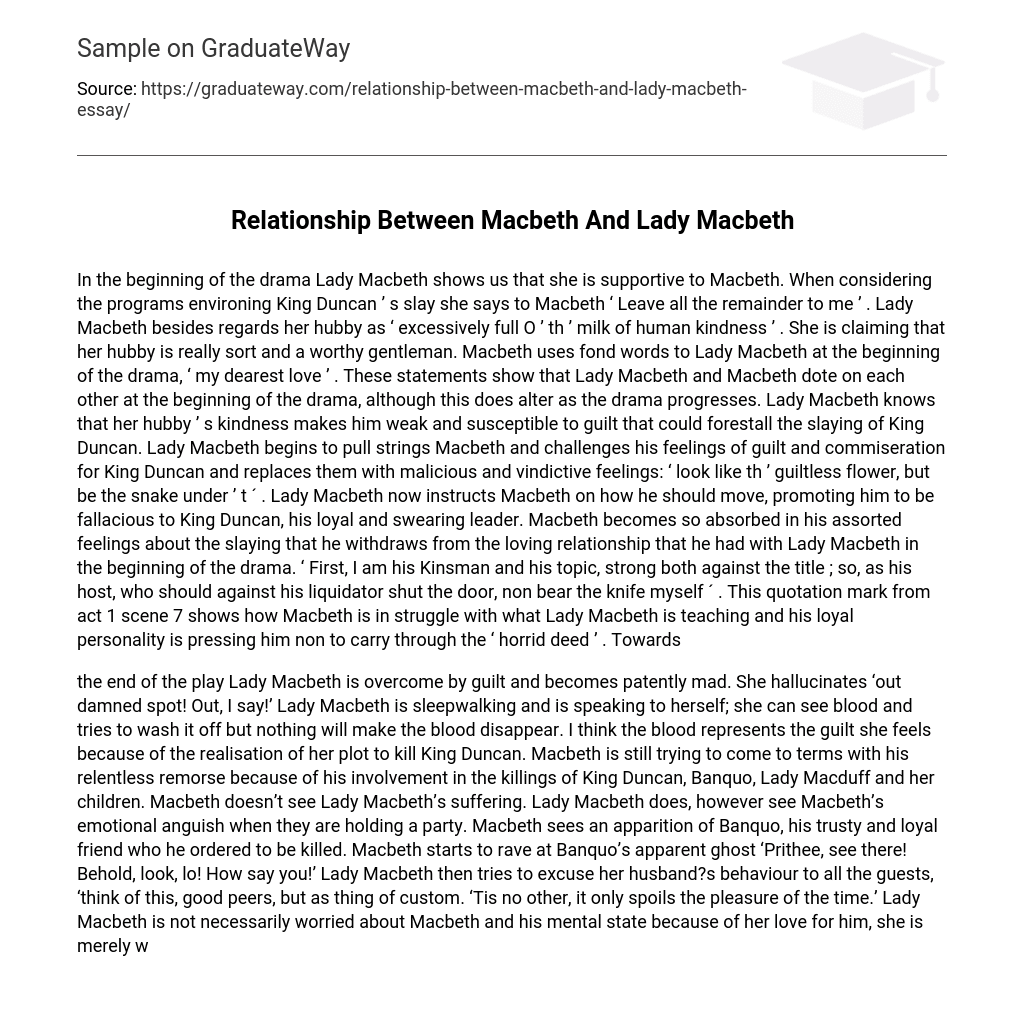In the beginning of the drama Lady Macbeth shows us that she is supportive to Macbeth. When considering the programs environing King Duncan ’ s slay she says to Macbeth ‘ Leave all the remainder to me ’ . Lady Macbeth besides regards her hubby as ‘ excessively full O ’ th ’ milk of human kindness ’ . She is claiming that her hubby is really sort and a worthy gentleman. Macbeth uses fond words to Lady Macbeth at the beginning of the drama, ‘ my dearest love ’ . These statements show that Lady Macbeth and Macbeth dote on each other at the beginning of the drama, although this does alter as the drama progresses. Lady Macbeth knows that her hubby ’ s kindness makes him weak and susceptible to guilt that could forestall the slaying of King Duncan. Lady Macbeth begins to pull strings Macbeth and challenges his feelings of guilt and commiseration for King Duncan and replaces them with malicious and vindictive feelings: ‘ look like th ’ guiltless flower, but be the snake under ’ t ´ . Lady Macbeth now instructs Macbeth on how he should move, promoting him to be fallacious to King Duncan, his loyal and swearing leader. Macbeth becomes so absorbed in his assorted feelings about the slaying that he withdraws from the loving relationship that he had with Lady Macbeth in the beginning of the drama. ‘ First, I am his Kinsman and his topic, strong both against the title ; so, as his host, who should against his liquidator shut the door, non bear the knife myself ´ . This quotation mark from act 1 scene 7 shows how Macbeth is in struggle with what Lady Macbeth is teaching and his loyal personality is pressing him non to carry through the ‘ horrid deed ’ . Towards
the end of the play Lady Macbeth is overcome by guilt and becomes patently mad. She hallucinates ‘out damned spot! Out, I say!’ Lady Macbeth is sleepwalking and is speaking to herself; she can see blood and tries to wash it off but nothing will make the blood disappear. I think the blood represents the guilt she feels because of the realisation of her plot to kill King Duncan. Macbeth is still trying to come to terms with his relentless remorse because of his involvement in the killings of King Duncan, Banquo, Lady Macduff and her children. Macbeth doesn’t see Lady Macbeth’s suffering. Lady Macbeth does, however see Macbeth’s emotional anguish when they are holding a party. Macbeth sees an apparition of Banquo, his trusty and loyal friend who he ordered to be killed. Macbeth starts to rave at Banquo’s apparent ghost ‘Prithee, see there! Behold, look, lo! How say you!’ Lady Macbeth then tries to excuse her husband?s behaviour to all the guests, ‘think of this, good peers, but as thing of custom. ‘Tis no other, it only spoils the pleasure of the time.’ Lady Macbeth is not necessarily worried about Macbeth and his mental state because of her love for him, she is merely worried about her husband exposing the secret that only her and Macbeth know about, killing King Duncan. After Macbeth’s outburst she shows feelings of embarrassment and being ashamed of her husband’s behaviour as he was showing that he was weak and not worthy of becoming King. ‘You have displaced the mirth, broke the good meeting with most admired disorder’. This comment was to humiliate Macbeth and make him feel ashamed and guilty of his lack of self





